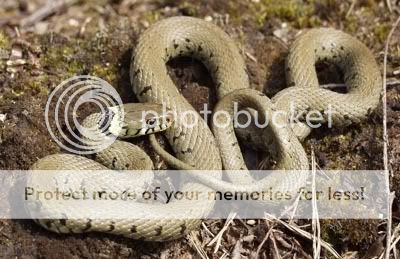Reptile Rescue Den
Admin


Number of posts : 2711
Age : 54
Location : Bolton, Lancs. UK
Registration date : 2007-12-24
 |  Subject: Grass Snake - Natrix natrix Subject: Grass Snake - Natrix natrix  Thu Jan 10, 2008 8:10 pm Thu Jan 10, 2008 8:10 pm | |
| The Grass Snake is the most abundant snake in Britain. Commonly found south than the north. Estimated breeding population of 320,000  The Grass snake is the larger of three British Snakes, reaching up to five foot in length (although the do grow larger in warmer climes) and can be found throughout the southern regions of Britain, generally in areas close to water where it can find its favourite type of food, frogs and toads. One of the reasons it can survive the British climate is due to the fact that it hibernates away from October through to March and April, thus staving off the times when the sun is at its weakest, allowing the snake to only come out when it can get enough energy from the sun to survive. As mentioned, these snakes are often found in areas where there are ponds, lakes or slow running rivers where frogs and toads live. Grass snakes are strong swimmers so can easily move through the water looking for prey, sometimes taking small fish or even the odd small mammal if their first choice isnít on the menu. Unlike the adder, Grass Snakes donít have any venom so there is no real risk to humans if you come in contact with one, as with all snakes they are very shy and will slink off quickly if they feel the vibrations something approaching, that being one of the reasons why they are rarely spotted in passing. To see a grass snake you either have to get lucky or be very patient and very quiet around their natural habitat. Due to clearance of large areas traditional woodlands and wild areas Grass Snakes numbers have been drastically reduced in recent years to the point where they are now a vulnerable species. Grass Snakes mate and lay between ten and 40 eggs in Spring and incubate them in their burrows for around 10-12 weeks, once hatched the little snakes head off on their own with many becoming lunch for a wide range of animals, very few making it through to adult life. Hotspots Typical places you can find a grass snake are amongst piles of dead and rotting plant material, they often hibernate and lay their eggs. Compost heaps in gardens are likely places, especially if there is a good healthy pond nearby which supports a population of frogs, toads and newts. Destruction of such habitats in peopleís gardens is another reason why Grass Snakes, as well as other traditional British animals are on the decline. | |
|
